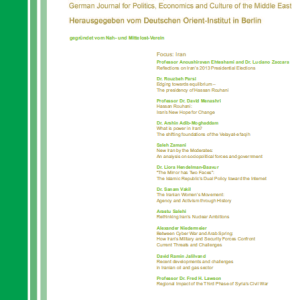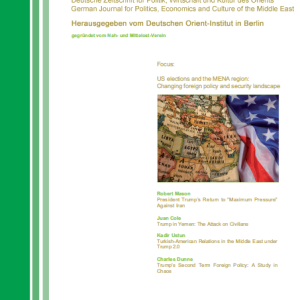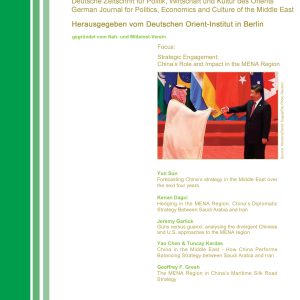Shop
Showing 65–80 of 349 resultsSorted by latest
-

Hassan Rouhani: Iran’s New Hope for Change
7,90 €incl. VAT
Add to basket -

Edging towards equilibrium – The presidency of Hassan Rouhani
7,90 €incl. VAT
Add to basket -

Reflections on Iran’s 2013 Presidential Elections
7,90 €incl. VAT
Add to basket -

Orient IV 2013 – Iran
26,00 €incl. VAT
Add to basket -

Trump’s Second Term Foreign Policy: A Study in Chaos
7,90 €incl. VAT
Add to basket -

Turkish-American Relations in the Middle East under Trump 2.0
7,90 €incl. VAT
Add to basket -

Edging towards equilibrium – The presidency of Hassan Rouhani
7,90 €incl. VAT
Add to basket -

President Trump’s Return to “Maximum Pressure” Against Iran
7,90 €incl. VAT
Add to basket -

Orient II 2025 – US elections and the MENA region: Changing foreign policy and security landscape
26,00 €incl. VAT
plus Shipping Costs
Select options This product has multiple variants. The options may be chosen on the product page -

The MENA Region in China’s Maritime Silk Road Strategy
7,90 €incl. VAT
Add to basket -

China in the Middle East – How China Performs Balancing Strategy between Saudi Arabia and Iran
7,90 €incl. VAT
Add to basket -

Guns versus guanxi: analysing the divergent Chinese and U.S. approaches to the MENA region
7,90 €incl. VAT
Add to basket -

Hedging in the MENA Region: China’s Diplomatic Strategy Between Saudi Arabia and Iran
7,90 €incl. VAT
Add to basket -

Forecasting China’s strategy in the Middle East over the next four years
7,90 €incl. VAT
Add to basket -

Orient I 2025 – Strategic Engagement: China’s Role and Impact in the MENA Region
26,00 €incl. VAT
plus Shipping Costs
Select options This product has multiple variants. The options may be chosen on the product page -

Domestic and geo-politics put Syrians in Turkey between a rock and a hard place
7,90 €incl. VAT
Add to basket




